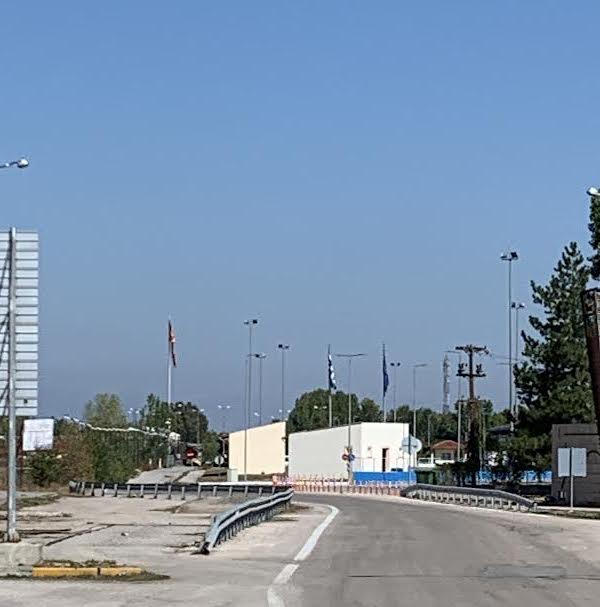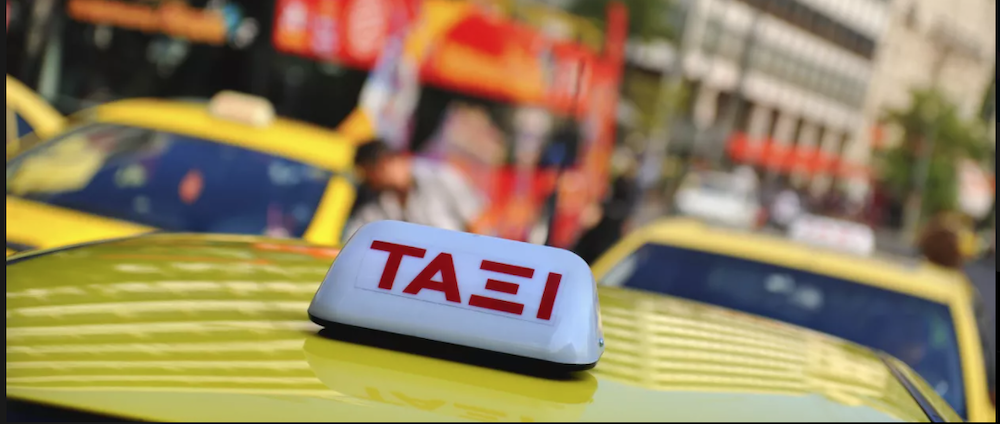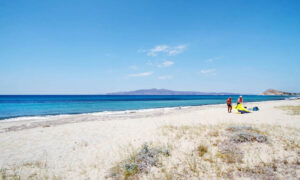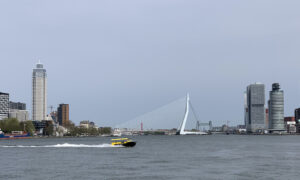During a recent trip, I witnessed a brazen act of corruption at the border between North Macedonia and Greece. Don’t get me wrong, I’m from Chicago where corruption is a way of life, but this was so out-in-the-open that I was taken aback.

As Marie Chêne, Head of Research and Knowledge at Transparency International points out in a 2018 report for the U4 Anti-Corruption Resource Centre:
There are a number of specificities that make border activities particularly vulnerable to corruption, including: poor external oversight; the level of autonomy and discretionary authority border officials enjoy; high tariffs and complex regulatory frameworks that provide traders with incentives to bribe; the pressure of organised crime networks; the inadequate salary and working conditions of border officials; and the specific organisational features of border protection agencies. Corruption at borders manifests itself through various forms, including petty bribery, bureaucratic corruption, misappropriation, organised crime related corruption and political corruption.
Travelers tell tales of their experiences with corruption at border crossings all the time, but I’d never witnessed it firsthand.
Now I have. Here’s my story:
A friend and I were crossing from North Macedonia into Greece on our way to see the waterfalls in Edessa and spend a day at the Pozar Thermal Baths near Aridaia. I called a driver I had previously used on a trip from Greece into North Macedonia.
On my previous trip, the driver was working for a private company. This time I called him directly and he agreed to take us to Edessa for about half of what it would have cost us to book the trip through the company.
After filling out our PLF and verifying that we had our vaccine cards and passports in order, we headed for the border. Before we arrived at the checkpoint on the North Macedonia side, our driver warned us that, if asked, we should just say that he is our friend. As North Macedonian taxi drivers are required to have a special permit to operate in Greece, and he was not driving for the company this time, his services were not covered by his permit once we entered Greece.
A game of chicken
The North Macedonian border guards checked our paperwork, chatted with the driver, and waved us through. On the Greek side, however, we handed over our passports and waited … and waited … and waited.
After about 20 minutes, it was obvious that the driver had been caught out. He said that he was probably not going to be allowed to cross, so he took my friend’s WhatsApp number, told us to ask for our passports, and said he’d send his friend to meet us on the other side of the border to take us the rest of the way.
I stepped out of the car and approached the window where I was told rather curtly to get back in the car and wait. We waited for another 20-to-25 minutes before our passports were finally handed back to us and were told that we could cross the border on foot, but our driver would not be going with us.
Were we ever at risk of not being able to cross the border? Of course not. They wanted to make life difficult for our driver, not us. But we were pawns in their little game of border-crossing chicken.
With passports in hand, we crossed the border and walked to a gas station where our driver told us his friend would meet us. After another long wait, the friend arrived, but the jig was up. He had been stopped at the border and warned that if he picked us up and was caught, he would receive a substantial fine.
That left us on the Greek side of the border eating snacks and drinking a Sprite from the cooler, while debating what we should do next. The owner of the gas station advised us that we could call a metered cab to take us all the way to Edessa, but it would be pretty expensive since we were still about a 90-minute drive away. We could have taken a shorter taxi ride into the next mid-sized city in Greece and catch a bus onward to Edessa, but the schedule on the website wasn’t easily accessible and the timetable was missing, or, we could get to Florina (said mid-sized city) and spend all day waiting for the only remaining train going to Edessa that evening.
We finally concluded that our best option was to reach out to the owner of the Airbnb where we had stayed in Florina a few days prior, who had connections in the transportation industry. Within minutes, he sent someone to pick us up and bring us to Edessa by private car for only slightly more than our original trip would have cost.
Luck was with us that day, though not with our original driver, who told us his actions would result in a black mark on his record and a restriction from driving for hire for 24 hours.
This all happened on a nice sunny morning and we had a comfortable place to sit outside while we went online to figure out our options. Also in our favor was the fact that the gas station owner spoke English and was happy to help us out by calling us a cab if we decided to go that route. Our final bit of luck was that we didn’t have a train or plane to catch and had no real plan other than to explore Edessa, so it didn’t really affect us much.
On a side note, this time I had a friend with me, but usually I’m a solo female traveler and I couldn’t help but think how different the situation would have been if this had happened at night or during the winter. What if the gas station had been closed? What if I didn’t have a cell signal or access to the internet? What if I couldn’t find a ride into Florina?
What a coincidence!
So where’s the corruption in my story, you might be wondering? One of the officials at the border is known for not letting the North Macedonian drivers through if there’s even the slightest suspicion that they might be taking a fare over the border, because HIS BROTHER IS A TAXI DRIVER on the Greek side of the border and he wanted to make sure his brother got the fare. When I went to retrieve my passport, he asked me several times, rather insistently, if we needed a taxi – knowing of course, that we were now without transportation, and was rather put out that I turned down the offer, having had the situation explained to me by our driver.
Would it have been easier for us to accept the services offered? Sure. But I’m not going to support this two-bit corruption just on principle.
Would my answer have been different if I had a plane or train to catch? Very likely. After all, their corruption is not my problem.
We weren’t the only travelers who were affected that morning by this blatant display of graft and nepotism. While we were waiting for our passports to be returned to us, another car drove up with an American couple who ran into the same problem. We thought they might eventually join us on the other side of the border and possibly want to share a ride, but we never saw the car that they were in cross in Greece, so maybe they just backtracked into North Macedonia and came up with an alternate plan.
I conclude my little tale of corruption with a few potential solutions to what is a persistent problem according to our original driver — who, by the way, apologized profusely and made an official complaint.
• Solution A: Knowing the situation, North Macedonian drivers, with or without the necessary permit, could let out their passengers before they hit the border, have them walk through, drive through sans passengers, and pick up the passengers at the gas station once they’ve crossed into Greece. If they don’t have the necessary permit, they would still be at risk of being fined, but if they did, at least they wouldn’t be held up without cause.
• Solution B: Taxi drivers on both sides of the border could set up a mutually beneficial system where passengers are taken the border, walk across, and are picked up by another driver from the same company or a partner company on the other side for the remainder of the journey. Granted, I’m not sure of the business implications of this or if there are political motivations for not offering this kind of service, but it would certainly be beneficial for travelers who want to cross the border and not be negatively affected by the games being played by corrupt individuals.
• Solution C: Greece could set up an independent taxi stand at the gas station where travelers could contact a Greek taxi driver by phone if they don’t have a cell signal or access to WiFi. Sure, sometimes you might actually be taking a ride from the brother of the border guard, but at least this solution levels the playing field.
The bottom line is that corruption is not something that should be tolerated at any border crossing. It should be promptly addressed by the governing authority for the sake of travelers and the integrity of the system.
If you’ve experienced a similar situation, please share your story in the comments below.
About the author: Beth Hoke rejoined the expat life after spending her childhood in Europe and the United States, then settling in Chicagoland to raise two daughters.
Now an empty nester, she is roaming Europe, armed with a TEFL certificate and an online position teaching English for EF.Beth has been traveling around Europe for four years. She’s filed posts for Dispatches Europe from at least six countries including Italy, Germany, Croatia, and Madeira, Portugal.
See more of her Dispatches posts here.
Read more here in our Greece archives.














